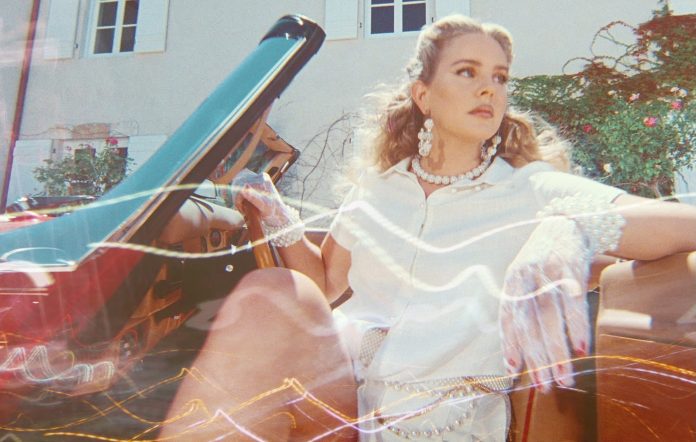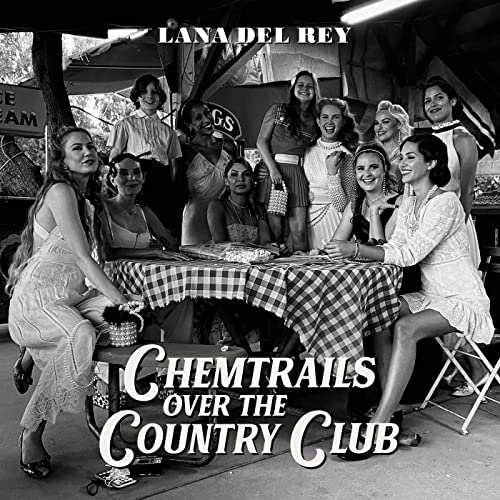JESSICA MEDITZ
Editor in Chief

After what feels like forever, fans can finally listen to Lana Del Rey’s highly anticipated album, “Chemtrails Over The Country Club.”
It’s the singer-songwriter’s seventh studio album, following the critically acclaimed “Norman F*cking Rockwell.”
Both albums were co-produced by Del Rey and Jack Antonoff, the face of indie pop project, Bleachers.
Prior to listening, I was optimistic for the new album, but I knew one thing — “NFR” would be pretty damn hard to top.
The singles showed promise, though.
Back in October, Del Rey released “Let Me Love You Like a Woman.” Although fairly unpopular among fans, I enjoy this track.
It’s definitely not one of those songs you immediately love on the first listen, as the beginning especially feels a bit slow. But once you give it a chance, it grows on you.
To kick off the new year, Del Rey dropped the album’s title track along with its mystic music video.
In true Lana fashion, the lyrics combine otherworldly themes such as “contemplating God” and lush, prized possessions like jewels and red sports cars to tell a story.
The background instrumentation is pretty tame because her voice alone does the job. Overall, it’s a strong title track that sets the tone for the record.

Two standouts for me were “Tulsa Jesus Freak” and “Dark But Just A Game.”
Both tracks flirt with R&B and other genres in many respects and have addicting beats.
“Tulsa Jesus Freak” stylistically overuses autotune in a way that Del Rey usually stays away from, but in this case, it works.
I predict “Dark But Just A Game” will be a fan favorite.
It has very interesting instrumentation, incorporating different elements of percussion, piano and more. The song alternates between high and low energy, keeping me guessing what might happen next.
“White Dress” and “Not All Who Wander Are Lost” are comparable as well.
Both tracks are extremely raw and emotionally honest, but also have notably repetitive lyrics.
The choruses are sung in an intentional, high-pitched voice, reminiscent of her “Born To Die” days.
I especially enjoyed the beautiful, bare piano instrumentation in “White Dress,” though, which evokes a feeling of nostalgia and melancholia right away.
“Wild At Heart” has the references of Sunset Blvd. and drinking Jack and Coke that mysteriously bring you back to an era you never lived in, but combines that with the more timely (and my own new personal favorite lyric,) “coffee pots and Insta thots.”
I very much enjoy this song, but I can’t get over how much the chorus sounds like “How to Disappear” on “Norman F*cking Rockwell.” That explains why I like it so much.
As a long-time fan, I had high expectations for “Yosemite,” a song I first heard Lana talk about on the radio that I skipped class to listen to in high school.
“Yosemite” was supposed to be on her fifth album, “Lust for Life,” but was ultimately cut. I will say that this track definitely would have fit in better on that album thematically.
Produced by Rick Nowels, not Antonoff, “Yosemite” feels like the odd one out. It is stylistically similar to her song, “When The World Was At War We Kept Dancing.”
While this track isn’t a standout for me right now, I don’t think it’s weak by any means.
The guitar in the background is pretty and gives the song a folky, acoustic feel.
In the last three tracks, Del Rey experiments with the Americana music genre instead of simply referencing themes of ‘50s-‘60s Americana.
“Breaking Up Slowly” and “For Free” are both collaborative tracks that I could take or leave.
When Del Rey does collaborations, it’s truly hit or miss. In the past, she’s done dreamy collaborations with The Weeknd and A$AP Rocky, whose voices contrast hers, but ultimately work out extremely well.
“Breaking Up Slowly” features country singer Nikki Lane, and “For Free” a Joni Mitchell cover, features singers Zella Day and Weyes Blood.
Both songs have a lot of potential, but ultimately I don’t think the artists’ voices complement Del Rey’s well.
I think I would enjoy them more if she recorded them solo.
The bridge of “Dance Till We Die” is all the rage on Twitter, but I don’t think the rest of the song is anything special.
It drags on for the first two and a half minutes, and then shocks fans with an incredibly powerful and bluesy bridge.
I’d love to see a whole album of hers that sounds like that bridge, but unfortunately it wasn’t enough to salvage this song for me.
“Chemtrails Over The Country Club” has its highs and lows, but all in all I do not think it is very cohesive.
“This is probably the first album where, I would say, I knew what I wanted it to be, but I didn’t know if I got there,” Del Rey admitted on BBC 1 Radio.
The album feels sort of pieced together and lacks a bit production wise, compared to “Norman F*cking Rockwell.”
Although I’d put it at about a 7/10 right now, I have a feeling that “Chemtrails Over The Country Club” will grow on me with time.
Being too genuine for her own good has gotten Del Rey into trouble at times, but it’s the main reason I’ve admired her for many years.
This album hasn’t changed that.
